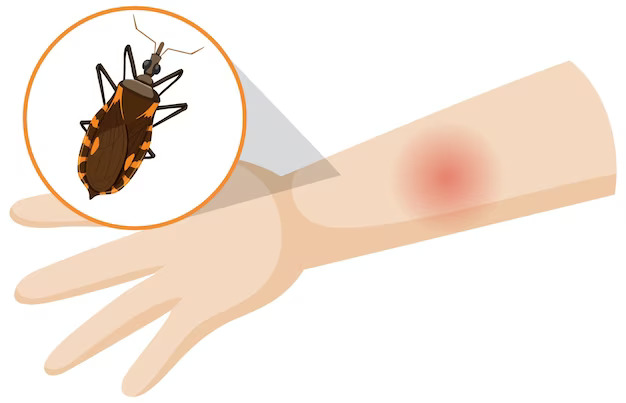Preventive Healthcare
Chagas Disease: Symptoms, Causes, Treatment & Genetic Testing
4254 Views
0

Chagas disease is a parasitic infection that affects millions of people worldwide. If you want to learn more about Chagas disease, here's an in-depth blog about its symptoms, causes, diagnosis, genetic testing options and treatment options. We'll dive into the history of this disease as well as the latest research on how it spreads and how we can combat it.
What is Chagas Disease?
Chagas disease, also known as American trypanosomiasis, is a parasitic infection caused by the protozoan Trypanosoma cruzi. The parasite is transmitted to humans through the bites of certain species of triatomine bugs, commonly referred to as "kissing bugs".
Chagas disease is endemic in 21 countries in Latin America. The majority of infections occur in rural areas of Central and South America, where poverty and poor living conditions contribute to the spread of the disease.
Symptoms of Chagas Disease
The symptoms of Chagas disease can be divided into two phases: acute and chronic.
During the acute phase, which can last for weeks or months, symptoms may include fever, fatigue, body aches, headaches, rashes, and swollen lymph nodes.
In some cases, the parasite can also cause an inflammation of the heart muscle (myocarditis), which can lead to cardiac failure and death.
During the chronic phase of Chagas disease, which can last for years or even decades, symptoms are often more subtle and may include gastrointestinal problems such as constipation or diarrhoea, difficulty swallowing (dysphagia), weight loss, and irregular heartbeat.
In some cases, the parasites can also damage the nervous system, leading to problems with vision or coordination.
If you think you may have been exposed to the parasite that causes Chagas disease, it's important to see a doctor right away.
Causes of Chagas Disease
Chagas disease is caused by the protozoan parasite Trypanosoma cruzi, which is transmitted to humans through the bite of an infected Triatomine bug. The bugs typically live in cracks and crevices in substandard housing in rural areas of Latin America. The parasite can also be transmitted to humans through blood transfusions, organ transplants, or from mother to child during pregnancy, delivery, or breastfeeding.
Once the parasite enters the human body, it travels to the heart and digestive muscles where it multiplies. This can result in serious damage to these organs and can lead to death.
There is no cure for Chagas disease, but it can be treated with medications that kill the parasites and reduce symptoms. Early diagnosis and treatment are critical to preventing serious health complications.
Diagnosis of Chagas Disease
There are two stages of Chagas disease: acute and chronic. The acute phase generally lasts for 2-4 weeks and is characterized by fever, swelling at the site of the insect bite, lymphadenopathy, and hepatosplenomegaly. The chronic phase can last for years, and patients may experience cardiac or gastrointestinal problems.
A definitive diagnosis of Chagas disease can be made using serologic tests (e.g., ELISA), imaging studies (e.g., echocardiography), or molecular methods (e.g., PCR). In some cases, a skin biopsy may also be performed to look for the presence of T. cruzi parasites. Genetic testing can also be used to diagnose Chagas disease in newborns born to mothers with the infection.
Genetic Testing for Chagas Disease
Genetic testing is available for Chagas disease. The test detects the presence of T. cruzi DNA in a patient’s blood sample, which can help confirm an active infection or rule out an inactive one.
Genetic testing for Chagas disease can also be used to identify potential treatments that may be effective against a particular strain of parasites present in a patient’s body.
Once a diagnosis of Chagas disease has been confirmed, treatment should begin as soon as possible. Treatment typically involves multiple antiparasitic medications taken over several weeks or months.
Treatment for Chagas Disease
Chagas disease typically spreads to humans through the bite of an infected triatomine bug. Once inside the human body, the parasites can multiply and invade various tissues, causing damage to the nervous system, heart, and gastrointestinal tract.
There is no cure for Chagas disease, but it can be treated with antiparasitic medications. These medications are most effective if started within the first few weeks after infection. In some cases, surgery may be required. In addition, patients will likely receive lifestyle advice from their doctor, such as avoiding bug bites and practising good hygiene practices.
Prevention of Chagas Disease
To prevent Chagas disease, it is important to take steps to avoid contact with vectors of the disease, such as Triatoma bugs.
This includes taking measures to reduce infestation of these bugs in homes by sealing off potential entry points, using insecticides, and regularly inspecting homes for signs of infestation.
Additionally, you must be aware of the risk of infection through blood transfusions and organ transplants, and thus be sure to use screened blood products whenever possible.
Finally, individuals can protect themselves by wearing long sleeves and pants when in areas where Triatoma bugs may be present.
Conclusion
Chagas disease is a serious health concern, and it is important to understand the symptoms, causes, diagnosis, genetic testing and treatment of this condition. Although there is presently no known cure for Chagas disease, early detection and prompt treatment can reduce the severity of symptoms and prevent complications down the road. If you think that you may have been exposed to Chagas disease or if you experience any of its associated symptoms, be sure to consult your doctor as soon as possible.
Book genetic testing for Chagas disease at Metropolis Labs for accurate results and a hassle-free experience. By taking proactive steps towards understanding your risk factors and seeking appropriate medical attention when necessary, you can protect yourself from further harm caused by this potentially deadly infection.













1701259759.webp)









 WhatsApp
WhatsApp